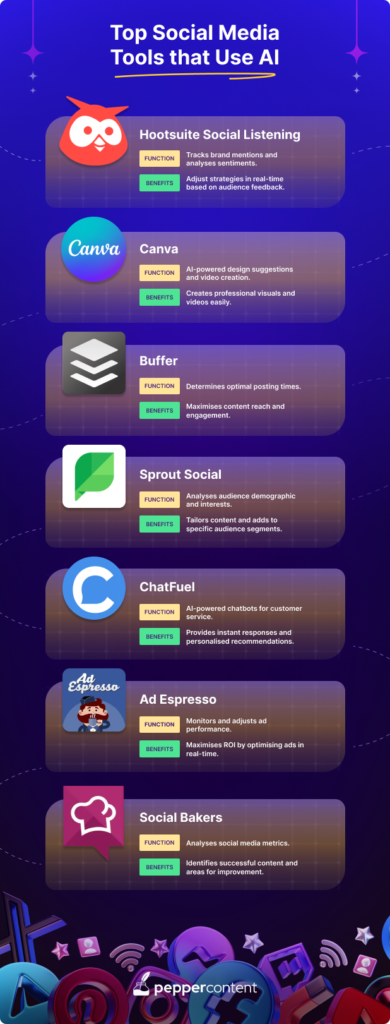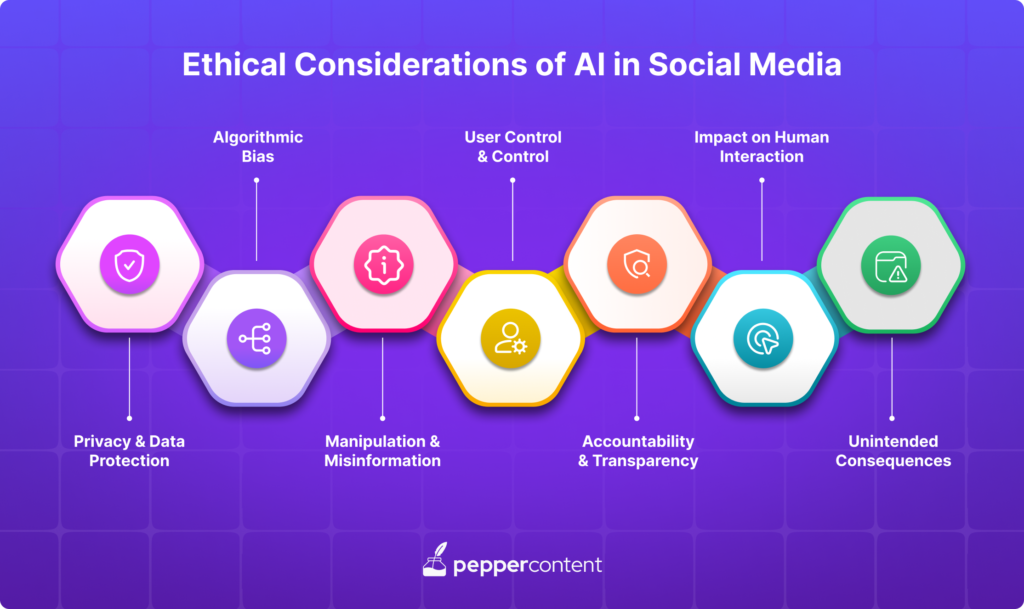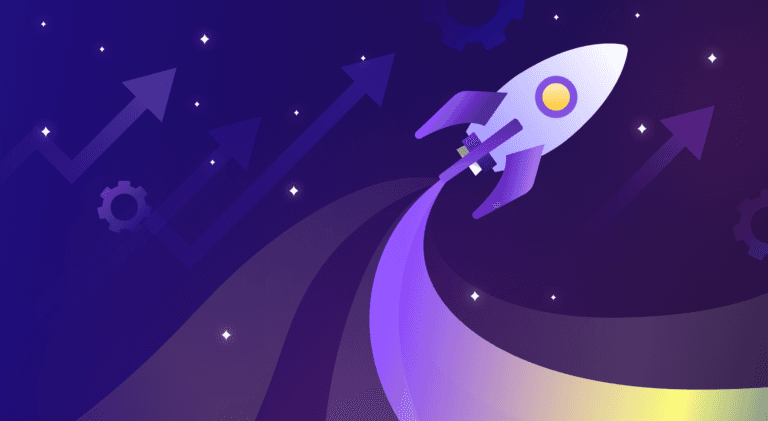The Role Of AI In Social Media Content Creation

Creating engaging social media content is paramount for businesses, influencers, and individuals.As the demand for engaging content grows, AI in social media becomes crucial for creating, managing, and sharing content at scale to keep up with the pace. This shift is changing how we approach social media strategies, offering new possibilities for creativity and consistency.
The Evolution Of AI In Social Media
Artificial Intelligence (AI) has been around for a while, but its integration into social media content creation is relatively recent. Initially, AI was used primarily for analytics, helping businesses understand audience behavior and trends. However, as AI technology has advanced, its applications have expanded to include content creation, curation, and engagement.
AI has moved beyond data analysis and is now a salient part of the creative process. From generating social media posts to personalizing content for different audiences, AI in social media is changing how we approach content creation.
AI-Powered Content Creation Tools
One of the most significant impacts of AI in social media is the advancement of AI-powered content creation tools. These tools implement machine learning algorithms to generate text, images, and videos tailored to specific platforms and audiences.
For instance, ChatGPT, Pepper Content, and Jasper AI can create compelling captions, blog posts, and articles in a short time. These platforms analyze existing content and trends to produce text that resonates with the target audience. Businesses can save time and resources while maintaining a consistent content output by automating the process of writing. Similarly, AI-driven design tools like Canva and Crello enable users to create visually appealing graphics without extensive design skills. These platforms offer templates and suggestions based on current design trends and incorporate AI into social media to ensure content remains fresh and relevant.

Personalized Content at Scale
One of the important challenges in social media content creation is maintaining a personalized touch while scaling efforts. AI in social media addresses this challenge by enabling the creation of content at scale.
AI algorithms analyze user data, including browsing history, likes, shares, and comments, to understand individual preferences. This information is then used to create content that resonates with specific audience segments. For example, an AI-powered tool might suggest different variations for a social media post for various audience groups, ensuring that the content feels personalized for each user.
This level of personalization enhances user engagement and fosters brand loyalty. When users feel that content speaks directly to them, they are more likely to interact with it, share it, and ultimately become loyal followers or customers.
Automating Content Curation
Content curation is another aspect where AI in social media is making an impact. Curating content involves selecting and sharing relevant third-party content that aligns with a brand’s message and resonates with its audience. Traditionally, this process has been time-consuming and labor-intensive.
AI-driven content curation tools, however, streamline this process by sourcing and recommending content based on specific criteria. These tools analyze vast amounts of data to identify trending topics, popular posts, and relevant articles. By automating content curation, businesses can ensure their social media channels are always filled with fresh, relevant content without constant manual inputs.
Enhancing Visual Content Creation
Visual content is fundamental in social media, and AI plays a crucial role in enhancing the creation of images and videos. AI-powered tools like DeepArt and Runway ML enable users to create stunning visuals with minimal effort. These platforms use AI to transform ordinary photos into works of art, apply filters and effects, and generate entirely new images from scratch.
Today, video content is the most consumed on social media platforms, and AI advancements are helping the video creation process. Tools like Magisto and Lumen5 use AI to automatically edit videos, add effects, and even generate video content from text. These tools make it easier for businesses to produce quality video content without extensive video editing skills.
AI in Social Media Advertising
AI’s role in social media content creation extends beyond creating posts. Social media advertising is critical for any digital marketing strategy, and AI makes it more effective and efficient.
AI-driven advertising platforms like Facebook Ads and Google Ads use machine learning algorithms to optimize ad targeting, bidding, and placement. These platforms analyze user data to determine the best audience for each ad, the optimal time to display it, and the most effective bid amount. By automating these processes, AI ensures businesses get the most out of their advertising budgets.
Moreover, AI can generate ad copy and visuals tailored to different audience segments, further enhancing the effectiveness of social media advertising and potentially leading to higher conversion rates.
Real-Time Analytics and Insights
AI in social media helps with content creation, real-time analytics, and insights. Understanding how content performs on social media is essential for refining strategies and achieving business goals.
AI-powered analytics tools like Sprout Social and Hootsuite provide real-time insights into content performance, audience engagement, and overall social media metrics. These platforms analyze vast amounts of data to identify trends, patterns, and areas for improvement.
For example, AI can detect and suggest the optimal times to post content, the types of posts that generate the most engagement, and the sentiment of user comments. By using these insights, businesses can make data-driven decisions that enhance their social media presence and drive better results.
The Ethical Considerations of AI in Social Media
While AI in social media offers numerous benefits, it also raises ethical considerations that must be addressed. One of the primary concerns is the potential for AI-generated content to be used in deceptive or manipulative ways. For instance, AI can create deep fakes—videos or images manipulated to appear real—which can be used to spread misinformation.
Additionally, the use of AI to generate personalized content raises privacy concerns. AI algorithms rely on vast amounts of user data to create personalized experiences, which can lead to concerns about data security and user consent. To address these ethical considerations, businesses must be transparent about how they use AI in social media. This includes disclosing when content is AI-generated, obtaining user consent for data collection, and ensuring that AI tools are used responsibly.

What’s Next for AI in Social Media and Content Creation?
As AI technology continues to evolve, its role in social media content creation is expected to expand. AI could become more integrated into the creative process, offering greater automation, personalization, and efficiency.
For example, AI could soon generate social media campaigns from start to finish, including content creation, scheduling, and analytics. This level of automation would allow businesses to focus more on strategy and less on execution, ultimately leading to more effective social media marketing.
By maximizing AI-powered tools and insights, you can create more effective social media strategies and connect with your audiences meaningfully.
Get a headstart on your social media strategy with Pepper Content’s Generative AI today!
Latest Blogs
Learn how to rank on AI search engines like ChatGPT, Perplexity, and Gemini by optimizing your content for authority, structure, and relevance. Stay ahead in AI-driven search with this strategic guide.
Explore the best healthcare SEO services for your medical practice. Improve online visibility and effectively reach more patients in need of your services.
Discover top social media agencies specializing in banking solutions, enhancing financial services and driving engagement.
Get your hands on the latest news!
Similar Posts

Artificial Intelligence
5 mins read
How Free AI Tools for Content Creation Can Boost Your Content Strategy

Artificial Intelligence
4 mins read
AI Content Generators: Making Content Creation Easier for Businesses

Artificial Intelligence
4 mins read